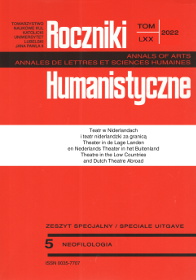Poetry Is Also Sound: The Art of Words as a Performing Art
Abstract
Broadly speaking, the development of poetry proceeds from an oral form, possibly accompanied by an instrument, to a written form. The invention of printing and the emergence of institutions such as publishing houses and bookstores gave written poetry a great status. The oral form remained but was limited to being read out or recited from the paper form. In order to bring this to a successful conclusion, rules were developed that the reading poet or performance artist had to comply with. This situation persisted into the 1960s. Presenting poetry on stage evolved after 1945 and led to radical changes in the art of performance in various phases. The question is whether this has led to a completely different type of poetry and whether the importance of the literary magazine still exists. And what are the consequences of these developments for the presentation of the texts themselves?
References
Alexander-Smith, An Jeanette C. ‘Feeling the Rhythm of the Critically Conscious Mind’. The English Journal, vol. 93, nr. 3, 2004, pp. 58-63.
Beets, Nicolaas. Gedichten. Gent: H. Honte, 1848.
Bouazz, Hassnae. ‘Poëzie en rap’. Passionate, vol. 6, nr 1, 1999, pp. 52-57.
Daan, Tatjana. ‘Poetry International ’99. Poëzie en gehoor’. Passionate, vol. 6, nr. 3, 1999, pp. 18-22.
Deckwitz, Ellen. ‘Verander “zoen” eens in “ruzie”’. NRC Handelsblad, rubriek ‘Gedichten met Deckwitz. Hoe lees je een gedicht’, 28 mei 2020.
Doorn, Johnny van. Verzamelde gedichten. De Bezige Bij, 1994.
Dütting, Hans, redacteur. Archief Johnny van Doorn: beschouwingen en interviews. De Prom, 1994.
Franssen, Gaston. ‘The Performance of Poeticity: Stage Fright and Text Anxiety in Dutch Performance Poetry since the 1960s’. Authorship, vol. 1, nr. 2, 2012.
Gogh, Ruben van. ‘Het gedicht van binnenuit. Over het effect van de voordracht’. Passionate, vol. 8, nr. 5, 2001, pp. 6-11.
Groenendijk, Heleen, en Mariette van Muijen. ‘Rappoëzie redt de dichtkunst’. Passionate, vol. 6, no. 6, 1999, pp. 30-33.
Grunberg, Arnon. ‘Mystiek’. Mystiek (bijna) geheime voetnoot 699, 26 januari 2021. (Instagram). Geraadpleegd op 31 jan. 2021.
Krul, Cornelis. ‘Poetry is not dead, leve rap. De breinkracht van MC Brainpower’. Passionate, vol. 6, nr. 6, 1999, pp. 6-7.
Peppelenbos, Coen. ‘De kracht van clichés’. Tzum.info, 24 jun. 2021. www.tzum.info/2021/01/column-coen-peppelenbos-de-kracht-van-cliches.
Pernoud, Régine. Hildegard van Bingen. Ooievaar, 1999.
Piryns, Piet. Er is nog zoveel ongezegd. Vraaggesprekken met schrijvers. Houtekiet, 1988.
Roelens, Xavier. ‘Popipoëten? De inbreng van poetry slam in de Nederlandse poëzie’. Ons Erfdeel, vol. 49, 2006, pp. 134-136.
Schiferli, Viktor, e.a. New Dutch Poets. Nederlands Letterenfonds, 2020.
Sterre, Kila van der. ‘Poetry slam in Nederland en Vlaanderen’. Kunsttijdschrift Vlaanderen, no. 363, 2017, pp. 16-19.
Strien, Giel van. ‘In den beginne’. Passionate, vol. 6, nr. 1, 1999, pp. 6-7.
Vreeswijk, Christina. ‘Poetry International ’99. De slam komt naar Europa’. Passionate, vol. 6, nr. 3, 1999, pp. 28-30.
Weiss, Jen, en Scott Herndorn. Brave New Voices: The Youth Speaks Guide to Teaching Spoken Word Poetry. Heinemann, 2001.
Wijngaarden, Clementine van. ‘Poëzie op het podium’. Passionate, vol. 6, nr. 1, 1999, pp. 30-33.
Wirag, Lino. “Die Geburt des Poetry Slams aus dem Geist des Theaters.” KulturPoetik, vol. 14, nr. 2, 2014, pp. 269-281.
Woods, Scott. ‘Poetry Slams: The Ultimate Democracy of Art’. World Literature Today, vol. 82, nr. 1, 2008, pp. 16-19.
Copyright (c) 2022 Roczniki Humanistyczne

This work is licensed under a Creative Commons Attribution-NonCommercial-NoDerivatives 4.0 International License.





